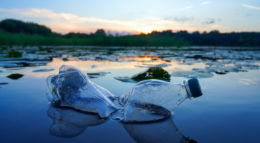It's time to end microplastics in our blood
I currently Chair the APPG for Microplastics and have put forward the Microplastic Filters (Washing Machines) Bill in Parliament. This legislation, if passed, would mean that all washing machines sold in the UK would have to be fitted with a microplastic filter.
It is currently the case that several countries have already legislated on this issue and many others are in more advance stages than the UK. Indeed, France has already enshrined this into law; from 2025 all washing machines sold in France will have to be fitted with a microplastic filter which captures particles as small as 50 microns.
Moreover, many consumers are unaware of what microplastics are and how harmful they can be. As Chair of the APPG for Microplastics, I therefore wish to increase education and awareness of the negative impacts microplastics can have on humans, other animals, and the environment.
It is estimated that there are over 50 trillion microplastic particles, and counting, in the world, with almost 1 trillion tonnes added every year. It is also estimated that the laundering of textiles accounts for up to 35% of total microplastics in the ocean, and that a single 6kg load of laundry can produce as many as 700,000 microfibres – the average load produces just under 140,000 microfibres.
The Women’s Institute (the APPG’s Secretariat) estimates that at least 9.4 trillion fibres are released per week in the UK.
It was recently reported that microplastics had been found in human blood for the first time. These particles are smaller than 1/100th of a centimetre and were found in over three quarters of the sample tested.

Whilst it is not known, at this stage, how harmful microplastics can be when inhaled, absorbed, or otherwise exposed to humans, having plastic flowing around the body does not sound beneficial. This is especially the case when you consider that microplastics are often coated in harmful chemicals such as pesticides, polychlorinated biphenyls (PCB's), and heavy metals.
Microplastics have also been found in birds, with some studies suggesting they can cause tissue and organ damage as well as harming their glands and potentially blocking their airways.
Moreover, a study completed 10 years ago found that approximately a third of fish observed had ingested microplastic. It is simply not acceptable that wildlife is harmed by the microplastic we deposit into our seas and rivers daily.
We must act to significantly reduce the amount of microplastics we pollute our waterways with. Whilst I can only change UK legislation, this is truly a global effort which requires all countries acting.
Introducing microplastic filters is one way of doing this, but in the long run there is much more that can be done. One such method is to mandate water companies to filter all treated effluent for microplastics.
Whilst they currently remove between 80-99% of microplastic, 65 million microplastic fibres continue to be discharged from the effluent of treatment plants daily. Having spoken with some of the APPG’s stakeholders, it is my understanding that this will, realistically, take 10 years to implement on a large-scale national level.
This is due to the current Government’s direction and the need for private sector companies to spend significant time and money producing these filters which, as you can imagine, are many times larger than microplastic filters in a domestic washing machine.
Finally, the Government have taken some significant steps to reduce microplastic pollution including the Sustainable Clothes Action Plan (SCAP) 2020 – part of the Waste and Resource Action Plan) which brought 85 clothing retailers together to reduce their environmental footprint. And the Textiles 2030 Action Plan shows a commitment to use improved and recycled fibres. Meanwhile in Europe the European Commission have reached a Cross Industry Agreement.
Further afield, several US states have legislated or are in the process of legislating for microplastic filters in washing machines.
The awareness of microplastics and the harm they cause is increasing. As is the introduction of legislation to help reduce the daily pollution of waterways. But there is still a long way to go.
I will continue to raise this issue in Parliament to further increase awareness and education on this issue. I will also continue to work with the APPG’s Secretariat – the WI – and the Group’s stakeholders to remain up to date on developments here in the UK and around the world.















